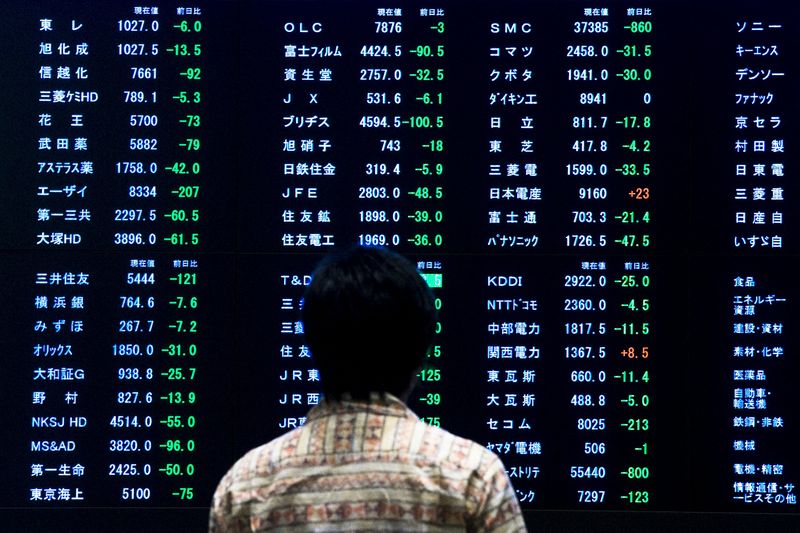Select Language

Most Asian stocks moved in a flat-to-low range on Friday with Japanese markets under pressure from substantially weaker-than-expected GDP data, while steep losses in Alibaba pulled down Hong Kong’s Hang Seng.
Regional markets took mixed cues from a middling overnight close on Wall Street, as tech stocks ran out of steam and as other sectors took little support from weaker-than-expected economic prints.
U.S. stock index futures were mildly negative in Asian trade, with S&P 500 Futures down 0.1%.
Still, Wall Street and most Asian stocks were sitting on gains for the week, having rallied sharply on a trade tariff deescalation between the U.S. and China.
Australian stocks also outperformed amid growing conviction that the Reserve Bank will cut interest rates next week.
Nikkei slips as Japan Q1 GDP shrinks more than expected
The Nikkei 225 index shed 0.5%, while the TOPIX index lost 0.3% after gross domestic product data showed Japan’s economy shrank more than expected in the first quarter.
GDP shrank 0.7% year-on-year in Q1, much more than expectations for a drop of 0.2%.
The reading was driven chiefly by softer exports, which faced some disruptions amid increasing U.S. trade tariffs, while local private consumption also remained weak.
Still, the soft GDP data drove up bets that the Bank of Japan will have less headroom to keep raising interest rates, keeping local monetary conditions more accommodative.
Hang Seng down as Alibaba slides on Q4 revenue miss
Hong Kong’s Hang Seng index was the worst performer in Asia on Friday, losing more than 1%.
The index was pressured chiefly by an over 5% drop in Alibaba Group (HK:9988) (NYSE:BABA), after the e-commerce giant clocked softer-than-expected revenue for the March quarter.
Alibaba’s cloud earnings- which are tied to its artificial intelligence ambitions- also missed estimates.
Alibaba rival JD.com (HK:9618) fell 2%, as the e-commerce giant’s earnings raised concerns over sluggish consumer spending in China, which has been tied closely to disinflation in the country.
Videogame developer Netease was an exception among Hong Kong stocks, rallying over 15% on positive first-quarter earnings.
Mainland Chinese markets also retreated. The Shanghai Shenzhen CSI 300 and Shanghai Composite indexes fell about 0.4% and 0.3%, respectively.
Still, Hong Kong and Chinese indexes were trading up between 0.8% and 2% for the week, having rallied sharply on the U.S. and China agreeing to temporarily slash their trade tariffs on each other.
But this rally petered out as investors sought a more permanent solution. Tariffs between the two countries also still remained relatively high.
Broader Asian markets mostly headed lower on Friday, but were set for weekly gains. South Korea’s KOSPI was flat, while Singapore’s Straits Times index shed 0.3%, even as the island state’s key non-oil exports grew much more than expected in April.
Australia’s ASX 200 was an outlier, rising 0.6% to a two-month high as investors bet that the RBA will cut interest rates next week.
Gift Nifty 50 Futures futures for India’s Nifty 50 index pointed to a mildly weak open, after the index rallied to near seven-month highs this week.

